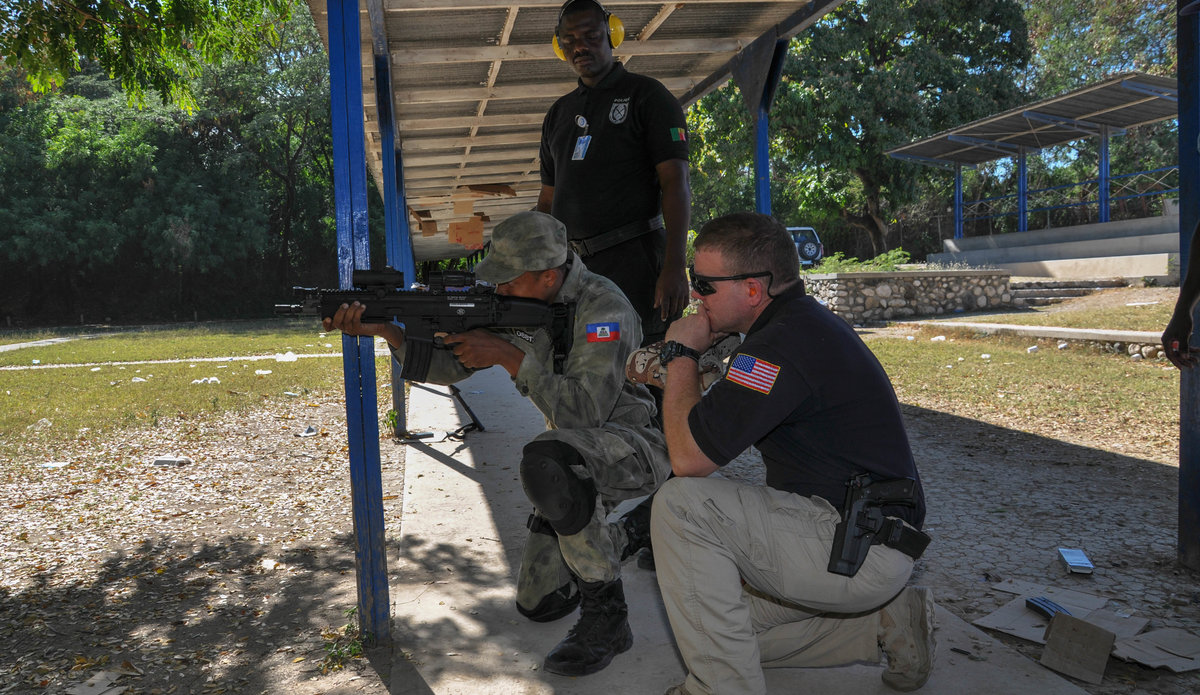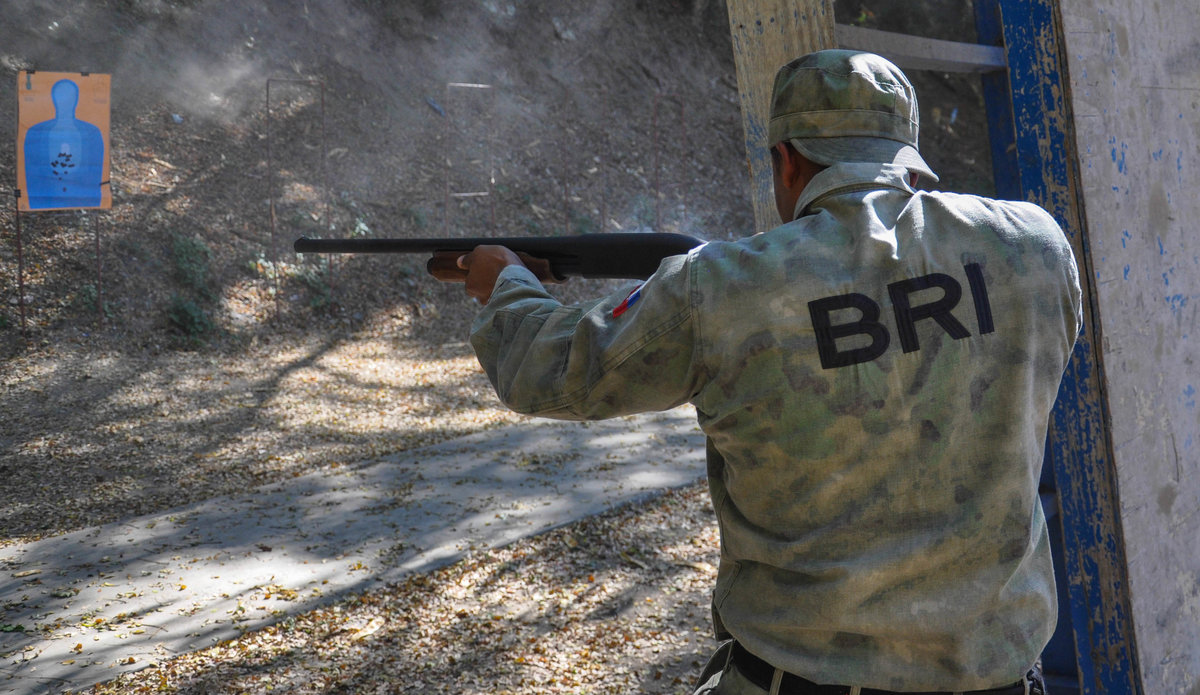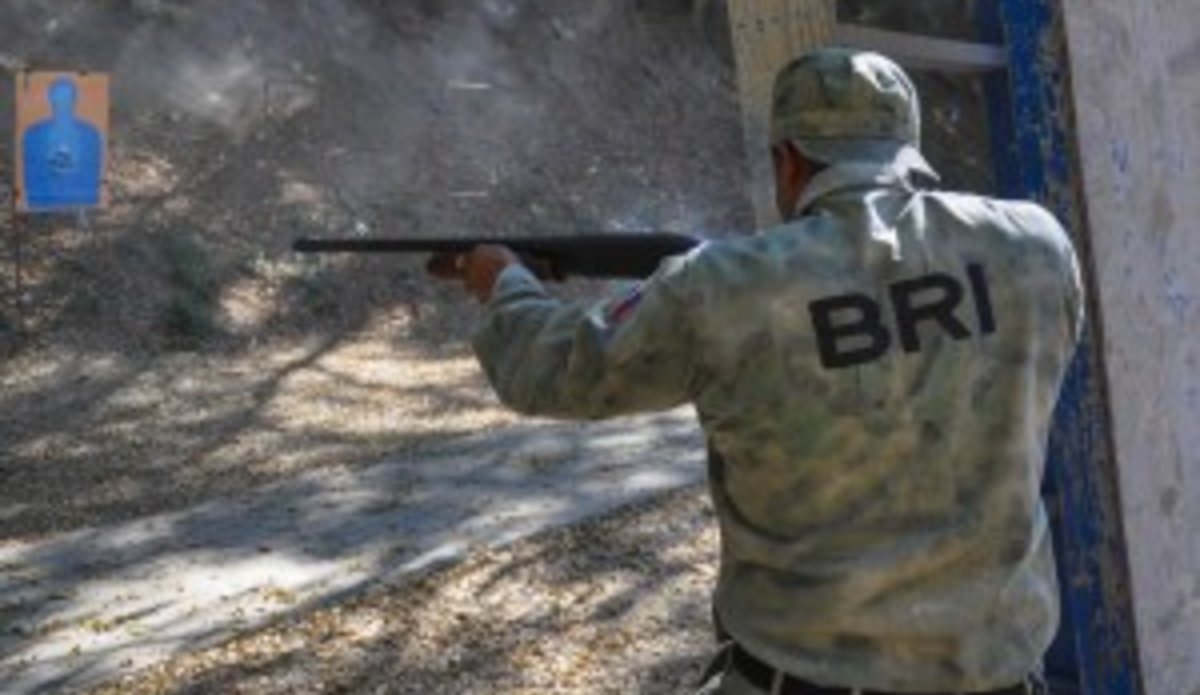BRI: an elite corps further 'professionalized'BRI : un corps d’élite se professionnalise
Within the framework of bilateral agreements between France and the National Police of Haiti (PNH), officers of the Brigade de Recherche et d’Intervention (BRI – Research and Intervention Brigade, in English) followed a week of training for handling long-barreled weapons. The course was taught by the UN police contingent, UNPol.
On the firing range of the Académie de Police Nationale d’Haïti in Port-au-Prince, the noise of weapons being fired is heard for miles around... Twenty police officers – some wearing ear-protection – shoot at cardboard targets.
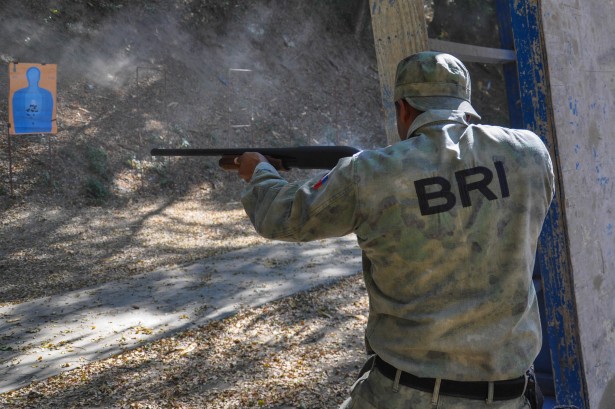 Photo : Patrick Ossart UN/MINUSTAH
Photo : Patrick Ossart UN/MINUSTAH
In the course of this skills training on the handling of long-barreled weapons – the third such training for the Brigade of 43 elite police officers – the BRI use their service weapons and shotguns, but they also familiarize themselves with new assault rifles made in Belgium. Through such training, says the team leader and UN Police member, Emmanuel Delaby, "we are achieving a higher professionalism within the BRI."
"It's a very good training, you learn quickly," says the BRI Chief-of-Staff, Jean-Richard Mothersil – himself a participant in the course. This unit of the Direction centrale de la police judiciaire (DCPJ – or Central Directorate of the Judicial Police in English) intervenes as part of its remit in cases of kidnapping. Thus, the police must be constantly prepared to face new challenges. "Things are never static, the way people use guns change with time," says agent Mothersil. "This is an excellent UNPol initiative, to refresh us from time to time," he adds.
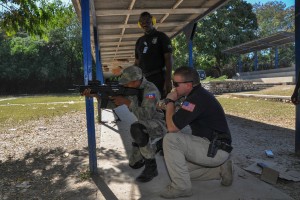 Photo : Patrick Ossart UN/MINUSTAH
Photo : Patrick Ossart UN/MINUSTAH
In order to increase the professional skills of the police, three instructors from the Ecole Nationale de Police (ENP – National School of Police in English) and three trainers from the DCPJ were also trained. "The increase of professional skills comes through the training of trainers " says Emmanuel Delaby who adds that "stemming from MINUSTAH, these 'trainers' will train other officers without the help or intervention of UNPol."
The five-day course ended on Friday, January 10th, with a presentation of certificates signed-off by both the PNH and UNPol. The UN trainers – four in number – were from France, the USA, Burkina Faso and Benin.
Within the framework of bilateral agreements between France and the PNH, the French government provided arms, ammunition and other equipment to the BRI, which is just one of the components of the PNH Development Plan 2012-2016.
Jonas Laurince
Dans le cadre des accords bilatéraux entre la France et la Police Nationale d’Haïti (PNH), les agents de la Brigade de Recherche et d’Intervention (BRI) ont suivi une semaine de formation sur des qualifications en armes longues. Les cours étaient dispensés par des policiers des Nations Unies (UNPol).
Sur le champ de tir de l’Académie de Police Nationale d’Haïti, à Port-au-Prince, les crépitements des armes se font entendre à des kilomètres à la ronde. Une vingtaine de policiers, certains coiffés de casques anti-bruit tirent sur des cibles en carton.
 Photo : Patrick Ossart UN/MINUSTAH
Photo : Patrick Ossart UN/MINUSTAH
Au cours de cette formation qualifiante sur le maniement des armes longues, la troisième que suit cette brigade de 43 policiers d’élite, les agents de la BRI utilisent leur arme de service et des fusils à pompe, mais ils et se familiarisent avec de nouveaux fusils d’assaut de fabrication belge. A travers cette formation, le Chef d’équipe et policier des Nations Unies Emmanuel Delaby, entend « arriver à une haute professionnalisation de la BRI ».
« C’est une très bonne formation, on apprend vite », se félicite le responsable du personnel de la BRI, Jean-Richard Mothersil, lui-même venu participer à l’entrainement. Cette unité de la Direction centrale de la police judiciaire (DCPJ) a pour mission d’intervenir lors de kidnappings. Ainsi, les policiers doivent être constamment préparés à affronter de nouveaux défis. « Les choses ne sont pas statiques, les positions de tirs ont changé », explique l’agent Mothersil. « C’est une très bonne initiative de la UNPol de nous recycler de temps en temps », ajoute-t-il.
 Photo : Patrick Ossart UN/MINUSTAH
Photo : Patrick Ossart UN/MINUSTAH
En vue d’augmenter les compétences professionnelles de la Police, trois instructeurs de l’Ecole Nationale de Police (ENP) et trois formateurs de la DCPJ ont eux aussi reçu cette formation. « L’augmentation des compétences professionnelles passe par la formation des formateurs », affirme M. Delaby qui ajoute qu’ « au départ de la MINUSTAH, ces formateurs auront à former d’autres policiers sans l’aide de la UNPol ».
La formation de cinq jours s’est achevée vendredi 10 janvier par une remise de certificats signés par la PNH et la UNPol. Les formateurs onusiens, au nombre de quatre, sont originaires de la France, des Etats-Unis d’Amérique, du Burkina Faso et du Bénin.
Dans le cadre des accords bilatéraux entre la France et la PNH, le gouvernement français a fourni les armes, des munitions et autres matériels à la BRI, un des éléments du Plan de développement de la PNH 2012-2016.
Jonas Laurince
 ONU
ONU Nations Unies Maintien de la paix
Nations Unies Maintien de la paix

